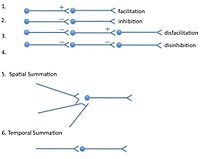Summation (neurophysiology)

Imagine you have some toys that you want to count. Let's say you have 5 balls, 3 cars, and 2 dolls. Instead of counting each toy separately, you can use summation to add up all the toys.
Now, let's apply this concept to how our brain works. Our brain is made up of special cells called neurons that communicate with each other through electrical and chemical signals. When a neuron receives many signals from other neurons, it adds them up using summation.
Think of it like a group of friends shouting out numbers. One friend shouts "2", another "3", and another "5". The fourth friend will add up all the numbers they hear and shout out the total - in this case, "10".
Similarly, when a neuron adds up all the signals it receives, it decides whether to pass on the message or not. If the sum of the signals is big enough, the neuron will fire an electrical signal of its own, passing on the message to other neurons downstream.
Summation helps our brain make decisions and control our body's functions, like walking or talking. It's an important concept in neurophysiology and helps us understand how our brain cells work together to make us who we are.
Now, let's apply this concept to how our brain works. Our brain is made up of special cells called neurons that communicate with each other through electrical and chemical signals. When a neuron receives many signals from other neurons, it adds them up using summation.
Think of it like a group of friends shouting out numbers. One friend shouts "2", another "3", and another "5". The fourth friend will add up all the numbers they hear and shout out the total - in this case, "10".
Similarly, when a neuron adds up all the signals it receives, it decides whether to pass on the message or not. If the sum of the signals is big enough, the neuron will fire an electrical signal of its own, passing on the message to other neurons downstream.
Summation helps our brain make decisions and control our body's functions, like walking or talking. It's an important concept in neurophysiology and helps us understand how our brain cells work together to make us who we are.
Related topics others have asked about:
